

What will the English language be like in 100 years? One way of predicting the future is to look back at the past.

The global role English plays today as a lingua franca – used as a means of communication by speakers of different languages – has parallels in the Latin of pre-modern Europe. Having been spread by the success of the Roman Empire, Classical Latin was kept alive as a standard written medium throughout Europe long after the fall of Rome. But the Vulgar Latin used in speech continued to change, forming new dialects, which in time gave rise to the modern Romance languages: French, Spanish, Portuguese, Romanian and Italian. Northern English accents becoming more similar, researchers find. Northern accents are becoming more similar and softer as the number of educated city-dwellers rises, research has found.

Linguistic experts at the University of Manchester found evidence of a pan-regional “general northern English” accent among middle-class northerners. Analysis of speech patterns across the north of England, conducted using machine learning algorithms, showed there was little distinction between the accents of people in Manchester, Leeds and Sheffield. 'Laziness has won': apostrophe society admits its defeat. A society dedicated to preserving the “much-abused” apostrophe is to be shut down as its chairman said “ignorance and laziness” had won.
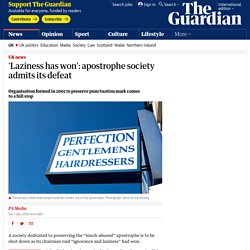
John Richards, who worked in journalism for much of his career, started the Apostrophe Protection Society in 2001 after he retired. Now 96, Richards is calling time on the society, which lists the three simple rules for correct use of the punctuation mark. Writing on the society’s website, he said: “Fewer organisations and individuals are now caring about the correct use of the apostrophe in the English language. “We, and our many supporters worldwide, have done our best but the ignorance and laziness present in modern times have won!” Richards started the society after seeing the “same mistakes over and over again” and hoped he would find half a dozen people who felt the same way.
Love Island is a lesson in how language, like, evolves. Love Island is not for everyone.

You might not appreciate the dating show’s rowdiness; its relentlessness (nearly 50 episodes this season!) ; its raunch. But even if you’re able to tolerate all that, you might draw a line at the language. Time. The decline of the gradable adverb: 'quite', 'rather' and 'fairly' are becoming a relic of the past. 'Th' sound to vanish from English language by 2066 because of multiculturalism, say linguists Resistance to changes in grammar is futile, say researchers. When it comes to changes in language, there’s no point crying over spilt milk: researchers charting fluctuations in English grammar say the rise of certain words, such as spilled, is probably down to chance, and that resistance is futile.

Comparisons have long been drawn between evolution and changes in language, with experts noting that preferences such as a desire for emphasis can act as a type of “natural selection”, affecting which words or forms of grammar are passed on between generations. But a new study shows that another evolutionary mechanism might play a key role : random chance. The authors of the study say that the work adds to our understanding of how language changes over centuries. “Whether it is by random chance or selection, one of the things that is true about English – and indeed other languages – is that the language changes,” said Joshua Plotkin, co-author of the research from the University of Pennsylvania. The Linguistic Evolution of 'Like' In our mouths or in print, in villages or in cities, in buildings or in caves, a language doesn’t sit still.

It can’t. Language change has preceded apace even in places known for preserving a language in amber. You may have heard that Icelanders can still read the ancient sagas written almost a thousand years ago in Old Norse. It is true that written Icelandic is quite similar to Old Norse, but the spoken language is quite different—Old Norse speakers would sound a tad extraterrestrial to modern Icelanders. 'They', used in a singular sense, clinches Word of 2016... With the guts of 10 weeks left to go before we usher in 2017, the American Dialect Society’s annual meeting has just made an early grab for defining the ‘Word of the Year’ for 2016.
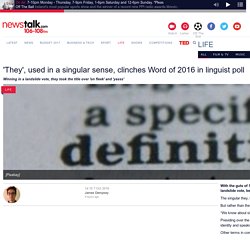
'They': the singular pronoun that could solve sexism – but is it grammatically correct? Who's 'they'? The rise of the gender-neutral singular pronoun. In its 26th annual words of the year vote, the American Dialect Society (ADS) has plumped for the word "they" as a gender-neutral singular pronoun.
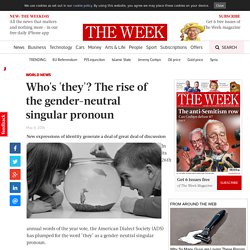
The choice has thrown light on the English language's lack of such a pronoun other than "it". Truly Trending: An Interview about Intensifiers. William Blake, Geoffrey Chaucer.
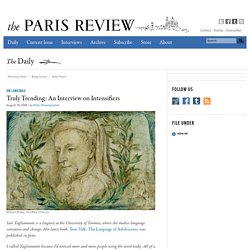
Sali Tagliamonte is a linguist at the University of Toronto, where she studies language variation and change. Her latest book, Teen Talk: The Language of Adolescents, was published in June. I called Tagliamonte because I’d noticed more and more people using the word truly. All of a sudden it seemed to be everywhere: in work e-mails and movie reviews, in headlines, on Twitter, on Twitter, and on Twitter. 'Southern' accents replacing dialects, language app finds. Image copyright Thinkstock Distinctive regional accents appear to have declined since the 1950s with more people now sounding like "southerners", researchers have concluded.
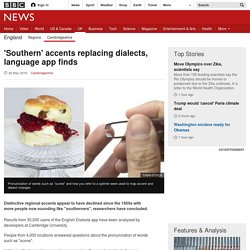
Results from 30,000 users of the English Dialects app have been analysed by developers at Cambridge University. People from 4,000 locations answered questions about the pronunciation of words such as "scone". Initial results showed more people now speak with accents similar to those in London and the south-east of England. More news from Cambridgeshire. BBC Radio 4 - Word of Mouth, Young Women as Linguistic Innovators. Lingua Obscura: Young Women's Language Patterns at the Forefront of Linguistic Change. Linguists observe that it is often the more marginalized groups in society that seem to effect language change over time, not the high-status networks where all the social capital and power reside. Consider young women’s language patterns and speech. By merely speaking, young women can invite negative reactions, comments, and suggestions to change the way they naturally talk if they want to be taken seriously.
Chi Luu is a peripatetic linguist who speaks Australian English and studies dead languages. Children put an accent on Milton Keynes. Conversation in Milton Keynes about accent, dialect and attitudes to language. - BBC Voices - Accents and dialects. TheAccentThatDareNotSpeakItsName. Estuary_English.pdf. Mobility, Meritocracy and Dialect Levelling (Kerswill 2001) Accent on common ground as Miliband takes on Russell Brand's estuary twang.
If there’s a man who knows what “mockney” Miliband is going through right now, it’s Steve McClaren. The former England football manager’s faux Dutch accent in an interview recorded while in charge of FC Twente is one of the most hilarious examples of how we pick up accents depending on context – and whether we’re trying to be liked or accepted. But it’s actually rather common. Joey Barton, the footballer, put on a French accent at a press conference in Marseille. And Oprah Winfrey has been criticised for copying the accents of her guests, adopting previously unheard southern vowels. Most of us will have experienced it, lessening or emphasising our regional accents or slang depending on the social situation. So for linguistic psychologists, it’s no surprise to see Miliband swap his bland north London speech for an estuary twang during his interview with Russell Brand, complete with street-style hand gestures.
Linguists are like, ‘Get used to it!’ In recent months, Senator Kirsten Gillibrand has used it; musician Buddy Guy has used it; Ferguson police officer Darren Wilson used it in grand jury testimony, as did his victim Michael Brown’s friend Dorian Johnson. A friend used it in an instant message chat to me, describing her attitude toward her sick boyfriend: “i’m like STAY OVER THERE.” It’s called the “quotative like,” and over the last 25 years, it’s become one of our language’s most popular methods of talking about talking. The use of “I’m like” or “he was like” to introduce a quote, a thought, or a feeling has spread through English worldwide, from Jamaica to New Zealand. One American dialect has rapidly adopted an even less by-the-book variation. In African American English, or AAE, a grammatically distinct variety, you can say not just “she was like,” but “she be like”—a version of “quotative like” with special powers of its own. Continue reading below. Stephen Fry on Room 101 - 2/3.
Stephen Fry on Room 101 - 3/3. Youtube. ChangingSoundsOfEnglish Coggle A3. Radio 4 Word 4 Word - London and the world. Dialect - English varieties of the British Isles. Introduction This guide is written for students who are following GCE Advanced level (AS and A2) syllabuses in English Language. This resource may also be of general interest to language students on university degree courses, trainee teachers and anyone with a general interest in language science.
Please look at the contents page for a full list of specific guides on this site. Back to top The Assessment and Qualifications Alliance (AQA) has made this a subject for examination within a general area of study described as Language and Social Contexts. In preparing this topic area candidates should study: the variety of regional forms in terms of accent, lexis and grammar; the social functions that dialects perform; the relationship between dialects and Standard English; historical and contemporary changes, where appropriate. The unstoppable march of the upward inflection. Is 'singular they' grammatically correct? @HaggardHawks explains all ...